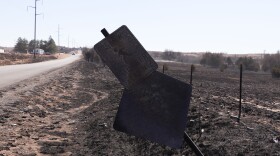Tornado season is upon us. Oklahoma saw powerful storms last week, and state and local emergency management leaders continue to grapple with questions about preparation.
What else can local governments and the state do to improve public safety? Are there new ways to fund private, school or community shelters? What can individuals do beyond the obvious to protect themselves, and what does the research show?
Oklahoma Watch executive editor David Fritze posed those questions to meteorologist Gary England and Oklahoma Department of Emergency Management director Albert Ashwood during a public forum March 31 at the Will Rogers Theatre in Oklahoma City.
“Preparedness is not something that is given to you by the federal government or by the state government. Preparedness begins right at home,” Ashwood said. “Sometimes we work against ourselves. With the wonderful warnings that we get from the meteorologists, people want more and more.”
England said meteorological forecasts and warnings continue to improve. The problem with the lack of preparedness lies with the public.
“We have all these great warnings, all this great stuff so to speak, and we still have a high number of fatalities and injuries and why is that? Well, a lot of that is not paying attention,” England said.
The longtime television meteorologist advised people to keep their smartphones handy during severe weather events, and to install a good weather app.
“The best thing is make sure you get the warning. And the second thing obviously is to know what to do,” England said.

England said severe weather forecasting has changed tremendously since he first entered the business. When he was a young meteorologist, he could issue warnings for western Oklahoma. Warnings were later narrowed to individual counties, and now to blocks and streets. England expects technology to continue to advance to allow even more precise tornado tracking.
“If the funds are available and you have the programmers and such we could send warnings out that by your street address, by the number on your house if you wanted to do that and even time of arrival, where the storm was and how long it will be before it gets there,” England said. “There is quite a bit of money involved in that, I don't know when that will come up but I do kind of see that in the future.”
KGOU produces journalism in the public interest, essential to an informed electorate. Help support informative, in-depth journalism with a donation online, or contact our Membershipdepartment.








